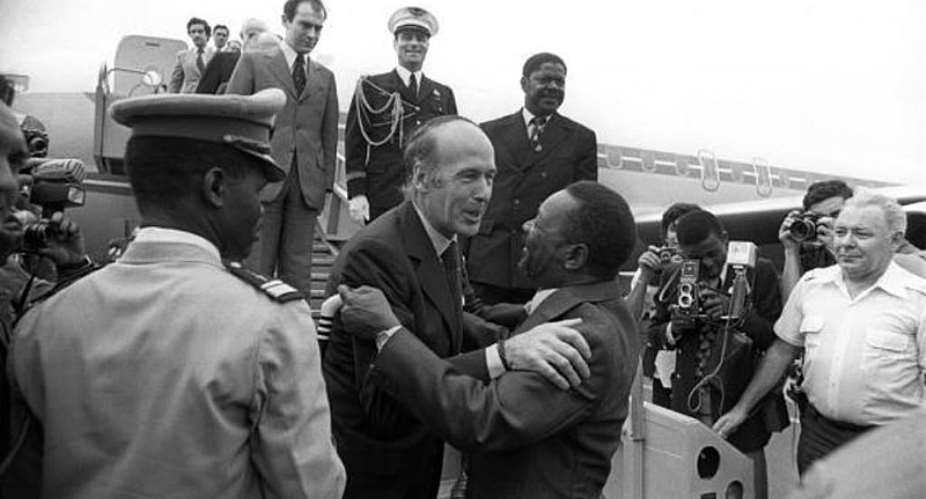Former French president Valéry Giscard d'Estaing, who died on Wednesday night at the age of 94, was considered a strong proponent of Françafrique, or the “secret criminality in the upper echelons of French politics and economy,” according to François-Xavier Verschave, former president of Survie, a French activist group opposed to all French neo-colonial activity on the African continent.
Giscard came to power in 1974, as the spectre of the Franco-Vietnam war continued to haunt the halls of the Elysée palace. Giscard's one-term, seven-year presidency (presidential terms changed after 2000 to five years) left an enormous French military footprint on the African continent, as well as a personal one.
Although he was a promoter of “Africa for Africans”, Giscard spearheaded five military operations on the continent over the course of three years: in Mauritania, Chad, the Central African Republic, and twice in Zaire, now the Democratic Republic of Congo.
The overall goals of French military interventions were determined by fears over the spread of Marxism on the African continent during the Cold War. Giscard was encouraged by Gabonese President Omar Bongo and Moroccan King Hassan II, both of whom had very friendly relationships with the French head of state.
“In 1974 when Valéry Giscard d'Estaing became president, instead of dismantling this old Gaullist network, he began a new era of military interventions,” wrote Douglas Yates, a professor at the American Graduate School in Paris, in the book Africa and the World, referring to African relations under former president Charles De Gaulle.
“The role of “Monsieur Afrique” became institutionalised in an African cellule at the Élysée,” he added, describing how France's role on the continent became embedded at the top echelons of French power.
Giscard's presidency was also marked by his discreet military and economic cooperation with South Africa in 1978, a country still in the grip of apartheid. French companies worked openly with the South African regime.
“There was no feeling of bad conscience whatsoever, and even less guilt, among French companies. Rather a sort of haughty contempt towards those who supported the African National Congress 'terrorists',” said Michel Capon, then a member of the International Solidarity Centre for Study and Initiatives.
Buddies with Bokassa
Giscard took the time to acquaint himself with various heads of state — he visited Guinea in 1978, which had gained independence in 1958, the first French president to do so. Guinea notably refused to join the French Community, a grouping of countries created by President De Gaulle.
Giscard's detractors would comment that, while his character and training were very far from African sensibilities, he was seduced by Africa and his personal rapport with African heads of state, including self-declared Central African Republic Emperor Jean-Bédel Bokassa, and Gabon's Bongo.
“Perhaps, notably with Bokassa, Giscard under-estimated the consequences of his relationship with him,” according to an 1990 editorial in Jeune Afrique magazine.
Bokassa, who ruled the Central African Republic as 'president for life,' and then as self-proclaimed emperor, began his professional life as a soldier in the French Colonial Army before seizing power in 1966. His reign, characterised as brutal, especially to his enemies, ended in 1979 after he was deposed by the French.
But his special relationship with the bourgeois French president, which included elephant hunts while on state visits, enabled Bokassa to dream big.
Crowning himself emperor in 1976, Bokassa held a lavish ceremony funded by Giscard's government, to the tune of 1.7 million euros.
Diamonds aren't forever
Towards the end of Giscard's only term as president, the French satirical newspaper Le Canard Enchâiné revealed in October 1979 that the French president had accepted two diamonds from Bokassa while he was the French minister of finance in 1974.
''They were not big stones,'' said Giscard in an interview in 1979, ''only something that could be used as a decoration or as jewelry. ''He claimed the diamonds had been sold and the money was given to a Central African charity.
The diamonds would be worth approximately 800,000 euros in today's money, according to INSEE, the French national statistics body.
The revelation helped to sink Giscard's ambitions for a second term.





 Akufo-Addo commissions Phase II of Kaleo solar power plant
Akufo-Addo commissions Phase II of Kaleo solar power plant
 NDC panics over Bawumia’s visit to Pope Francis
NDC panics over Bawumia’s visit to Pope Francis
 EC blasts Mahama over “false” claims on recruitment of Returning Officers
EC blasts Mahama over “false” claims on recruitment of Returning Officers
 Lands Minister gives ultimatum to Future Global Resources to revamp Prestea/Bogo...
Lands Minister gives ultimatum to Future Global Resources to revamp Prestea/Bogo...
 Wa Naa appeals to Akufo-Addo to audit state lands in Wa
Wa Naa appeals to Akufo-Addo to audit state lands in Wa
 Prof Opoku-Agyemang misunderstood Bawumia’s ‘driver mate’ analogy – Miracles Abo...
Prof Opoku-Agyemang misunderstood Bawumia’s ‘driver mate’ analogy – Miracles Abo...
 EU confident Ghana will not sign Anti-LGBTQI Bill
EU confident Ghana will not sign Anti-LGBTQI Bill
 Suspend implementation of Planting for Food and Jobs for 2024 - Stakeholders
Suspend implementation of Planting for Food and Jobs for 2024 - Stakeholders
 Tema West Municipal Assembly gets Ghana's First Female Aircraft Marshaller as ne...
Tema West Municipal Assembly gets Ghana's First Female Aircraft Marshaller as ne...
 Dumsor is affecting us double, release timetable – Disability Federation to ECG
Dumsor is affecting us double, release timetable – Disability Federation to ECG
